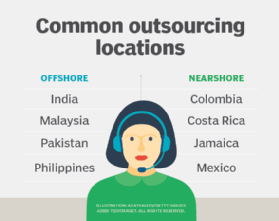
Getty Images/iStockphoto
10 myths about outsourcing contact centers
Some misconceptions include greater risk of security breaches and a loss in quality of service.
Outsourcing has become a necessary strategy for contact centers to provide additional resources to their workforce or provide customer support when it is not considered a core competency.
When a contact center goes down the path of outsourcing, it must select a business process outsourcing (BPO) partner that can fulfill specific business needs. It must also align with the organization's culture.
There are several variables to analyze when selecting a BPO partner, including the location of the outsourced call center -- onshore, nearshore or offshore -- and whether the BPO partner has a specialized practice or supports a variety of industries.
There can be many benefits to outsourcing. But contact centers must work closely with their BPO partners to mitigate any potential negative outcomes that can result from outsourcing.
Because call centers haven't addressed the risks of outsourcing in an appropriate manner, a list of myths has materialized, placing outsourcing in a negative spotlight. These myths exist because organizations aren't diligent when selecting a BPO partner and don't manage these relationships properly.
To succeed, organizations must select the correct partner and create a strong partnership. The concept of a partnership is critical because how the organizations work together goes beyond a simple business relationship.
Here are some of those outsourcing myths.
Myth 1. Outsourcing is only about cost savings
Taking advantage of cost-saving opportunities may be one of the goals of outsourcing, but outsourcing provides many additional benefits to an organization, including the following:
- ability to hire specialized talent, such as multilingual agents;
- ability to provide 24/7 customer support;
- ability to hire additional call center agents to handle call volume fluctuations; and
- less strain on internal resources in the talent acquisition process.
Myth 2. There is a loss of quality in service
It is up to the call center outsourcing the work to ensure that its outsourced partner's resources are trained properly.
It also needs the appropriate monitoring processes in place to ensure quality service. The same practices that are performed within an internal contact center -- specifically, monitoring and scoring phone calls, along with agent coaching -- should be performed at the BPO partner's call center.
Read some best practices for call center monitoring.
Myth 3. Contact centers lose control of the operation
With current contact center technology, there is no higher risk of losing control to an outsourced partner than to an owned contact center located down the street.
Contact center technology -- using both real-time and after-the-fact reporting -- provides a window into both the productivity and quality of the outsourcer's contact center operation.
Contact centers must establish and monitor KPIs and goals to ensure that the BPO partner is performing effectively. KPIs such as service levels, call monitoring quality and productivity should be reported in daily, weekly and monthly intervals.
Myth 4. Only businesses with large contact centers benefit from outsourcing
Many outsourcers focus on working with businesses that have large contact centers, providing low pricing because of economies of scale.
But there are also many outsourcers who focus on businesses who do not have the resources or core competency to operate an internal contact center, smaller call centers within specific industries or call centers that have specific needs, such as overnight coverage.
Myth 5. There is a larger risk of security and privacy breaches
In many cases, a BPO partner has more advanced security controls -- both preventive and after-the-fact reporting -- to protect their clients' data and information. This is especially true for smaller contact centers that do not have the resources to provide a high level of internal controls, such as Payment Card Industry compliance.
A partner's success is highly dependent on its reputation, and it can't risk client security and privacy breaches.
Myth 6. Outsourcing drives unemployment
In today's environment with low unemployment numbers, organizations are actually struggling to hire staff. Outsourcing isn't eliminating jobs.
If there is a concern regarding domestic job elimination, there are many outsourcers within the United States. Using these partners keeps jobs in the country.
To find a potential outsourcer, an organization can participate in industry or local events to find potential BPO partners. Organizations can also perform research on the web. If they find a potential BPO partner, they should perform follow-up work, including reference checks and calling the outsourcer, to determine if there is a fit.
Myth 7. Outsourcing fails because of language issues
In many ways, this is not a myth because organizations select the wrong partner for their needs.

It is crucial for organizations to select BPO partners that hire agents with the required skill sets, including language fluency. To eliminate language barriers, organizations should either outsource domestically or select a partner in a country with strong language parity. For example, if an organization is looking for a BPO partner fluent in English, it might consider a nearshore contact center. This is especially important if an organization is selecting a partner to handle inbound phone calls.
If a contact center is outsourcing back-office work that requires no customer contact, such as data entry, it may prefer to outsource to a nearshore or offshore call center because English fluency may not be a critical requirement.
Myth 8. Outsourcing runs on its own
Many organizations throw work at a BPO partner and assume it will perform the work as expected. Successful outsourcing requires more than setting up a simple answering service.
Organizations must realize that there needs to be an investment of time and effort -- including reviewing daily results, scheduling weekly calls and visiting sites quarterly site -- to ensure the outsourcer succeeds in its role. Two-way communication must be ongoing to ensure the BPO partner has a full understanding of the expectations of the operation, along with the tools to succeed.
In return, the BPO partner must be transparent with the contact center in providing accurate and timely insight into their results measuring both effectiveness and efficiency.
Learn more here about the top call center agent performance metrics to track.
Myth 9. Outsourcing is a threat to the internal workforce
When an organization outsources, it should let its workforce know the reason for outsourcing, such as language needs and operating hours, and that outsourcing provides supplemental staffing to an already busy workforce.
Myth 10. A BPO partner will not have the same culture as an internal call center
Contact centers need to share and help instill the appropriate culture into the BPO operation that is providing the outsourced contact center services.
Sharing the culture can incorporate many steps, including the following:
- branding all documentation with the organization's logo when it is shared with staff;
- holding regular calls between the client and BPO partner;
- visiting contact center sites quarterly, including serving meals, performing side-by-side monitors and hosting focus groups;
- educating contact center staff on the client's overall business, along with its goals and objectives; and
- hosting fun activities, such as contests, for the contact center staff and providing rewards and trinkets when appropriate.







